


Gilbert was a little boy who was going to have the first suit of clothes, that were not homemade. Wasn't that an event! Gilbert thought so. He was going to the city with father and mother to be fitted.
Mr. Haywood said to his wife. "You'd better take the boy and go with me as far as Branton. It's the best place I know of, for fitting out little fellows like him. Maybe I can stop over long enough to help you. I'll look up the time-table."
That's the way it happened that Gilbert and his mother came back to their home at midnight. For this story isn't about the hours in the city, it's about the reaching home so very late. Maybe you'll like to know, though, that the new clothes were all right, and Gilbert was a very happy though a very sleepy boy by midnight.
But he was wide-awake enough when the cab drew up at their own door, and he heard his mother exclaim. "Why, the house is lighted! There's a bright light in the living room, and in the dining room too!" Mrs. Haywood had paid the driver and he whirled the cab away before she thought. "I do wish I'd asked him to stay, until we could see what it means."
Gilbert was eager to press forward, but his mother put him behind her. She fully expected to see burglars searching for silver, or taking money from the desk.
But the sight which actually greeted her made her drop into a chair and laugh. And Gilbert! He threw up his cap, almost shouting. "That's great, isn't it, mother? Wasn't it cute of Billikens to light up for us to get in?"
Now Billikens was a beautiful white Persian kitten, which had come to Gilbert on his last birthday, and as full of mischief as a kitten could be. Billikens sat perched on the back of an easy-chair under one of the lights, looking for all the world as if he tried to say, "I did it, for sure."
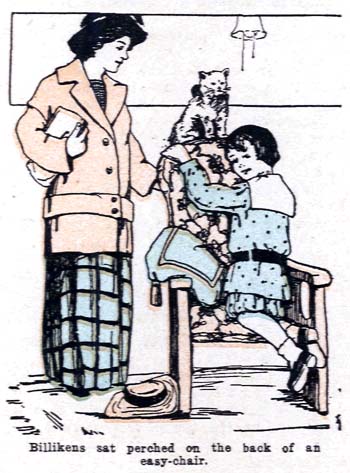
It was this way: Gilbert had often held Billikens up to play with the electric light cords, and once when the kitten had pulled just right, the light flashed out. Afterward, it became a kind of game to take him round to the brackets, and let him light up.
"I'm afraid we'll have to stop his doing it," Gilbert's mother said. "I doubt if you can teach a cat that what is done in play mustn't be done in earnest."
"That's too bad," Gilbert was quite grieved. "It's such fun to see him put on the lights. He almost laughs, himself. We could shut him up if we were away, mother dear."
"Well, perhaps."
Gilbert was a thoughtful little chap. Now he said, "I learned, didn't I, mother? Grandfather liked to have me pull his whiskers when he was awake, but once I pulled them when he was taking a nap, and he didn't like it one bit. I never did it after that."
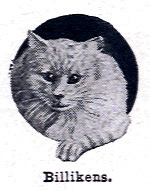
"I think you ought to invite Dilly to your party, Mildred," said Mrs. Fuller. "She lives so near us, and you've invited every other little girl on the street."
"Why," said Mildred, "she'd be sure to bring that dreadful doll that she loves so much. Some of the girls wouldn't come if she were invited. You said, mamma, I might ask just whom I pleased."
Mrs. Fuller said nothing more, and the dainty notes of invitation flew here and there, but none stopped at Dilly's door. Dilly hardly expected an invitation, but there were some bitter tears which fell down on Arabella's face.
Arabella was the name of one side of her doll. The doll was a crooked-neck squash with a stick for its body. It had two faces—one on each side of its head, and ink lines drawn round some of the yellow warts, made very prominent features.
This doll was the comfort of Dilly's life. The yellow noses were worn quite flat with her kisses, and she never had a trouble which was not poured into the two sympathizing ears, owned in common by Arabella and Angelina.
The afternoon of the party came, and Dilly, with her doll, watched the gay little folks gather on the lawn in front of Mildred's home. She soon became interested in their play, and quite forgot that she was not one of them, in her excitement over a game of hide-and-seek. Presently Mrs. Fuller called them for some pleasant surprise, and they all ran in, leaving their dolls leaning against the piazza.
There was nothing more to see. Dilly was gathering up her doll, when something made her spring up and cry out.
Rover, Johnny Cooper's dog, shot past her, barking loudly, his eyes gleaming with mischief.
Rover was the terror of every little girl in the neighborhood. Johnny sometimes teased his sisters by sending Rover after their dolls. Rover liked the sport, and came to think that dolls were his natural prey. Next to a big bone, there was nothing that delighted him so much as to shake a doll to pieces. He had seen the long row of dainty little figures, and was dashing towards them. Dilly ran after him, threatening and coaxing, but he did not notice her. Then she waved her turkey-red handkerchief, and screamed as loudly as she could, to attract someone's attention. But no one came.
Dilly thought of just one thing she could do. A last kiss on Arabella's face, and then—"Rover!"
The cry sounded so sharp and strange that Rover turned his head. S-w-i-s-h! Right down at his side there swooped such a queer-looking doll as Rover, with all his varied experience, had never seen. He made a dash for it.
Dilly darted past him, and, gathering up the dolls, laid them in the hall, and shut the door. Her apron was over her face when she went down the walk, but a strange, crunching sound told her what had happened to her doll.
Mildred found Dilly at home a few minutes later, folding away a little, ragged doll's cap, and drenching it with tears.
Mildred put her arms around Dilly's neck. "Oh, Dilly," she said, "it was so beautiful of you! Aunt Lou saw it all from the window. I'm so 'shamed to think how I've treated you. Do you think you could forgive me? If you could I'd love you all my life."
Dilly forgave her, and, all in her ragged dress, went home with Mildred. Every little girl kissed her, and she stopped to tea.
Not long after, a beautiful doll came to Dilly. It was Mildred's gift, and all the little girls who were at the party helped to dress it.
Dilly loves it dearly, and though it will never take the place of the dear, double-faced doll, she is very happy, for Mildred is her loyal friend.
—Selected.
A good cure for discontent—count your blessings every day.
It was a happy day for Jean when the cars started that were to take her and Big Sister all the way to Grandpa's.
When they left the train it was just as she had thought it would be. There was grandpa waiting to meet them, the ride through the green fields behind Prince, the big white house with dear grandma waiting at the door, Tobias the gray cat, the speckled hens; all her friends, for grandpa had even opened the pasture gate and let Jenny, the pretty Jersey cow, come on the lawn to welcome Jean.
And Jean! She had hardly taken off her hat before she ran out to see them all. But Jenny was her especial favorite, because grandpa had brought her up from a calf and she was so gentle that she had let Jean take many a ride on her back. Jean had just given her a good hug when grandpa came by leading Prince to pasture. "Please put me on her," she begged.
"All right," he answered. "Take hold of the strap round her neck and don't ride far."
"No, I won't. Jenny always stops for me to jump off when I want to."
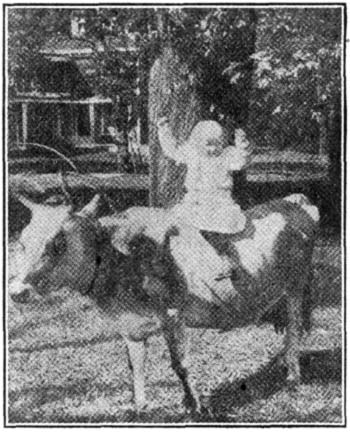
But when grandpa came back there was no little girl, no Jersey cow anywhere to be seen. Grandma and Big Sister had been so busy talking that they had not missed her, now when they called there was no answer. Where could Jean be?
But before anyone had time to be really frightened there was a patter of feet and Jean herself came running.
"Oh, oh," she cried, her eyes shining, "what do you think? Just as soon as I was on Jenny's back she started for the barn. And when we came round by the barnyard she stopped and said 'Moo, moo,' an' then a little calf—just like Jenny—that I hadn't seen 'cause it was lying down, jumped up, an' came running to the gate an' put its head through. Jenny put her head down an' kissed it, then she turned her head and looked at me, an' I jumped right down off her back an' kissed it too. For I knew it was Jenny's calf an' she had taken me out the first thing to show it to me. Wasn't it nice of Jenny to want me to see her calf? an' grandpa, can I name it?"
Grandpa said he thought it was very nice indeed, of Jenny to show Jean her baby, and they had been waiting for her to come and name it.
"Oh, oh!" cried Jean again, "and I have a name all ready. It is Daisy."

Rose and Marguerite were playing in the nursery when they heard a queer bumping noise down in the back yard.
"What's that?" asked Rose, stopping to listen.
"That's Stubby, kicking his heels against the settee. He's awful cross today," said Marguerite, and kept right on making the doll's bed. In a second Rose had her head out of the window. There sat Stubby, kicking his heels against the settee and looking dreadfully cross.
"Why, Stubby dear, what's the matter?" she called sweetly.
"Nuffin'," said Stubby.
"Why don't you play with the things in the garden?"
"What fings?"
"Wait a minute and we'll come down and show you," Rose said, drawing her head in.
"How can you play with that cross, cross Stubby?" asked Marguerite. "He isn't sick, and we've done everything to please him all day. He's just plain cross. And if you play with him we can't finish arranging the playhouse before five o'clock."
"Mother said I might stay till six," said Rose gently, "and I've thought of something to keep him busy. Come!"
Marguerite gave Rose a bear-hug and soon Stubby saw them coming across the lawn. Rose stopped under the apple tree to look for green apples.
"Muvver says not eat green apples," shouted Stubby.
Rose held up a little one. "Come on," she called. "Find one the size of that!"
Stubby became interested in spite of himself, and more so, as Rose began picking thorns off the rosebush and sticking them into the apple for eyes, nose and mouth.
Marguerite and Stubby began making one like Rose's.
"Now, find a stick and push it in for the body," said Rose.
Stubby rammed one in so hard that it came out at the top of his doll's head. "That'll be good to stick a hat to," he said cheerfully.
"They look pretty thin," said Marguerite holding hers at arms length.
"But wait till they have clothes on," said Rose happily. "Hollyhocks are fine for clothes."
So Stubby raced off for hollyhocks, picking the short stems off very carefully; first the large, silver-white ones, then shell-pink ones and last of all, the dark, velvety, red ones.
"Mine's going to be red," shouted Stubby, running back with his hands full.
"Then take three, one for the waist and two for the ruffly skirt," said Rose.
"I know what'll be good for a parasol," said Stubby, sitting down beside Rose.
"What?" asked Rose.
Stubby pointed to the morning-glory vine climbing all over the arbor, with its pink and violet blossoms rolled tightly up, just like an umbrella! Rose clapped her hands.
"Just the thing," she cried.
The children next made long braids of hair of striped grass, and fastened them to the backs of the dolls' heads with thorns. Then they bound broad sashes of satiny grass around the waists and used the flat nasturtium leaves for sailor hats.
"Now we must begin a house for them to live in," proceeded Rose. "Pick up little stones and make squares on the piazza floor for rooms."
Stubby soon made four rooms, leaving a door in each, with a hall down the middle.
"We can have grape leaves for blankets on the beds, and rose-petals for pillows, can't we?" said Stubby excitedly, "and a big, flat stone for a table and little stones for chairs!—and more rose petals for chair cushions!"
Marguerite was busily pinning a sweet-pea on her doll's head for a bonnet, and Rose finished arranging an acorn cup full of tiny green grapes for apples, before she replied.
"Stubby," she said at last, "you're a very clever boy."
She deftly cut a green apple in two as she spoke, and began hollowing one half out with a sharp stick. "This will make a good set-bowl," she said, getting very red in the face with so much digging. "Now, Stubby's got the idea, we can go back and arrange the playhouse."
"Oh, I'd rather do this!" cried Marguerite. "We can arrange that playhouse any rainy day."
"Well, if you want to, we'll keep on," said Rose, looking very happy, and giving Stubby a bear-hug.
Stubby didn't usually like being hugged, but this time he hugged Rose back, and said, "My doll's name is going to be Rose."
When the queen was riding in the forest she met the woodcutter's little daughter, and she was so pleased with the child that she invited her to visit at the palace. The child, Avis, came the next day, and she was taken up to the royal nursery to play with the princesses.
Before long the children were arguing about what game they should play. Then Rose, who was the eldest, remembered her duty to the visitor.
"What would you like to play, Avis?" she said.
"I'd like to play whatever the rest of you like," said Avis with her bright smile.
After that the princesses were ashamed to argue about it. They agreed to let Mignon, the smallest of them, choose. She chose Ring-around-a-rosy, and they all played, and had a great deal of fun.
When the queen came in for a few minutes Avis remembered to draw up the best chair, and place a footstool for her feet.
All day Avis was so sweet and good-natured that the princesses quite hated to part with her. They said good-night, when she went, urging her to come soon again.
"How does Avis learn to be polite?" Rose asked the queen that night. "She is only a poor woodcutter's daughter, and lives in a weed cottage. But she has better manners than we, who live in the palace."
"Why, my child, you have forgotten what politeness is. Mignon, my little one, I just taught you yesterday, stand forth and tell your sisters."
So Mignonette put her hands behind her, and chanted:
"Politeness is to do, and say"There, children," said the queen, "you see how it is. Politeness comes from a kind heart, and it makes a child lovely, and beloved, whether she lives in the hut or the palace."
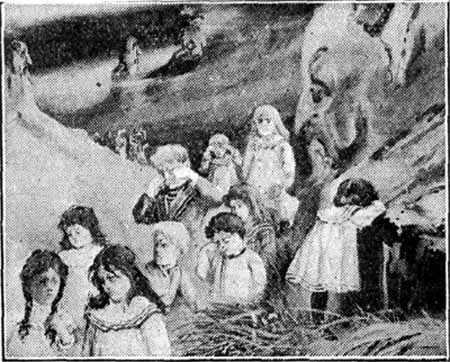
I am sorry to say that little Chalmers Ashton was afraid of things! And you know there was really nothing to be afraid of, for he lived in a safe, comfortable house in the best part of town, and there were father and mother and grandpa and Uncle James, Tilly the maid and Billy the hired man to look after him—to say nothing of Mr. O'Brien, the burly policeman in blue coat and brass buttons, who used to stroll up and down the street after nightfall.
But Chalmers used to "imagine things"—"think them up in his mind." I can't begin to tell you just what they were—only some were like snakes and some had horns and sharp teeth and glaring eyes and they growled like everything.
Chalmers made up a name for them; he called them "The Biters." Awful silly wasn't it, to be afraid of made-up things?
One day an animal show came to the town. For one whole day big white tents were in the meadow at the rear of the orchard which belonged to Chalmers' father, and, what with the rumbling red and yellow wagons, the noise and confusion, the shouting of the men, the roaring of the lions and howling and snarling of the other animals—well, really, it was almost like being next door to a jungle! And it was after midnight before everything was packed up and put on board the long train of cars.
Now the show people left one of their smaller wagons behind them; it was a very old one and something was the matter with it so that they didn't think it worth while repairing. So the next morning, there it stood near the elm tree out in the meadow. Then, what do you suppose? Well, it was a very foolish thing to do, but Chalmers got it into his head that some of the animals had been left in that wagon!
"I dare say they are 'Biters,' and maybe, sometime if I go near them, they'll pounce out and grab me!" the little boy said to himself, and not a day passed that he didn't cast scared glances toward the tattered cover of the wagon. Of course there were times when he felt quite brave and actually wanted to peep into the wagon; more than once he had visions of what a delightful time he might have with it, making believe it was a street car, or playing with it as an omnibus—but he never mustered up enough courage to do this.
One day as he came home from school he happened to glance at the wagon and his heart seemed to jump up into his throat. Surely there was something stirring inside that wagon; he saw the canvas cover bulge out—no, it wasn't the wind fluttering it! Besides he was positive that he heard queer noises inside.
"It's the 'Biters'—I know it is;" he gasped.
At first he was tempted to run right into the house, then something inside of him seemed to say, "Don't be such a coward, Chalmers! Don't you remember what the teacher told you today about General Washington and other brave men?"
So Chalmers stood still a minute.
"I'll not be a coward! Besides, there's mother sitting and sewing on the side porch."
So Chalmers climbed over into the meadow and went toward the wagon. When he got to the rear of it and peeped in, what do you think he heard and saw? Oh, such a lot of chuckles and giggles, and there, seated in a row were his cousins—plump little Marjory, laughing Sharley and cute little Jim!
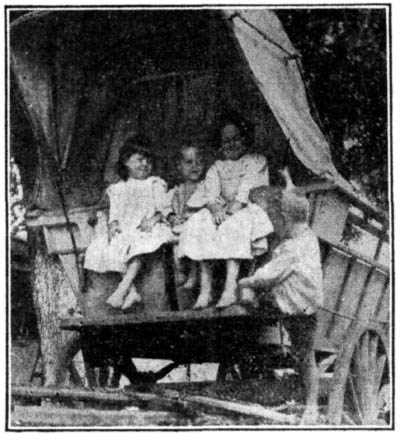
"We've come to spend the day with you and we thought we'd hide and surprise you!" cried Sharley, while Marjory added. "Oh, isn't this wagon the jolliest old place to play in! You must have lots of fun with it."
"Well, I'm going to have some fun with it now," Chalmers replied as he climbed up to take a seat beside her.

"My dress is so pretty," said Ruth, smoothing its soft fold and patting her own curls as she looked at her pretty reflection in the big mirror. "Yes," said the mother, "your dress is pretty, dear, and let mother tell you something about how many helped to make your dress.
"First, a little brown seed baby was put into the ground and it grew up to be a plant with flowers on it. Then the flowers dropped off and little green pods came in their places. These pods made a nice little house for the seed babies, but when the little seeds got ripe they burst their house open and it was all full of soft, white cotton. Some little boys and girls picked the cotton out, and then some men put it in a machine and took the seed all out of the soft white stuff, and then it went to another big house and was made into thread, and then into a beautiful piece of cloth, and mother and auntie made your pretty dress out of the seed babies' cotton blanket. Isn't it nice that everybody helps Ruthie girl to have pretty things."
—Written for Dew Drops by Francis McKinnon Morton.
Title.—The Wedding Feast.—Matt. 22:1-14.
Golden Text.—O Jerusalem, how often would I have gathered thy children together, even as a hen gathereth her own brood under her wings!—Luke 13:34.
Golden Text for Beginners.—We love him, because he first loved us.—1 John 4:19.
Truth.—The great love of Jesus is for even those who would harm him.
1. Jesus told a parable about the kingdom of heaven.
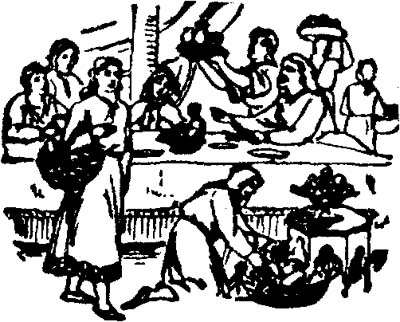
2. He said it is like a king who made a marriage feast for his son.
3. When the feast was ready he sent messengers to ask his guests to come to the feast.
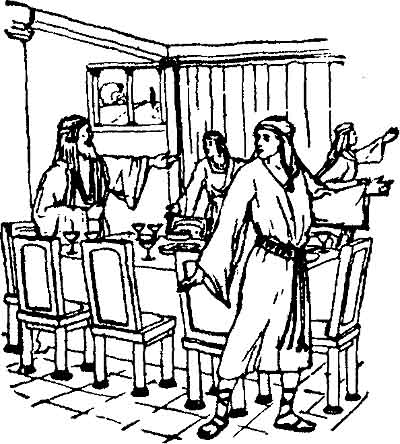
4. Some did not listen to the invitation, and others went about their work.
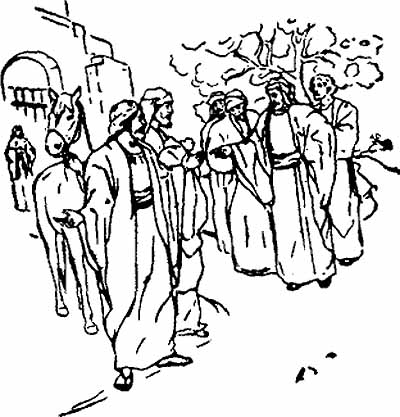
5. Still others abused the king's servants, and killed them.
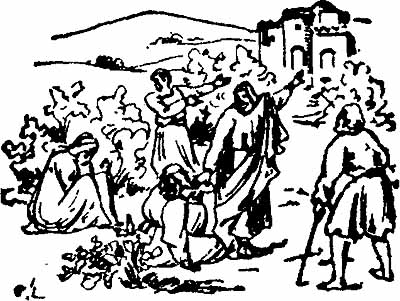
6. The king sent out his army to punish the murderers.
7. The king then sent his servants out into the streets to invite whoever could be found to come to the feast.
8. They brought in the poor and rich, the good and bad.
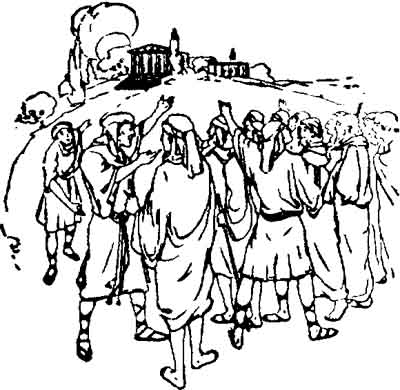
9. The king went in to the feast to see his guests.
10. He found one man who showed his disrespect for the king by not wearing his wedding garment as he should have done.
11. The king sent him away from the feast.
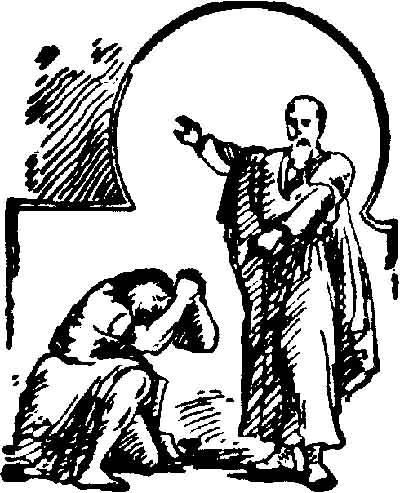
12. All are asked to come to God's feast, but few accept his invitation.
What is the Golden Text?
What is the Truth?
1. About what did Jesus tell a parable?
2. What did he say the kingdom of heaven is like?
3. When the feast was served for whom did the guests send?
4. To what did some of them refuse to listen?
5. What did still others do to the king's servants?
6. What did the king do to these murderers?
7. Whom did the king send his servants out into the streets to invite?
8. Whom did they bring to the feast?
9. Who went in to see his guests?
10. Who was not wearing the wedding garment?
11. What did the king do with him?
12. Who are asked to come to God's feast?
Tune—"Jesus loves me, this I know," omitting chorus (E flat).
Come and love the Savior now,A Day of Questions.—Matt. 22:15-22.
Render ... unto God the things that are God's.—Matt. 22:21.
We love him, because he first loved us.—1 John 4:19.

It is a poor rule that will not work both ways. At least, so thought Mrs. Fletcher, though her son, Ralph Fletcher, did not seem to be of the same opinion until he had first tasted some of his own medicine.
"I wish you would pick up that book, Ralph. You have stepped over it twice and have still left it on the floor," Mrs. Fletcher said to her son one morning.
"I did not drop it, mother; it was Grace," Ralph replied.
"And because you did not drop it, you think you should not pick it up? It would be a very unhappy world, Ralph, if all worked on that principle. However, as you seem unwilling to be polite and brotherly, I must ask Grace to place the book on the table again."
A few mornings afterward, Ralph went to his mother, saying:
"Mother, dear, will you take a stitch in this ball for me? I ripped it playing with Frank Danver. Will you do it now? because I'm in a hurry."
"I did not rip the ball, and so I see no reason why I should mend it," Mrs. Fletcher said. "You did the damage; you must repair it."
"Oh, mother—" Ralph began, then stopped suddenly.
"Yes. It is not quite as nice a rule for others to work by, is it, Ralph?"
"No; and it won't be nice for me after this, if I can help it," Ralph replied with a blush.
After which, one may be sure, the mother's fingers went to work quickly upon the ball. But that is a way mothers have, of ever standing ready to give help and encouragement to their boys and girls.
—Youth's Companion.
[Entered at the Post Office at Elgin, Ill., as Second Class Mail Matter.]
Price of Dew Drops.—In lots of five or more, to one address, 20 cents per copy per year, or 5-1/2 cents per copy per quarter. Address,
DAVID C. COOK PUBLISHING CO., ELGIN, ILL.